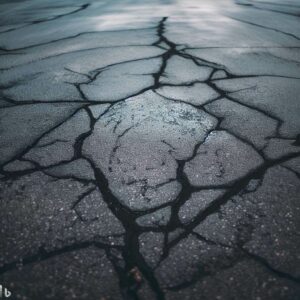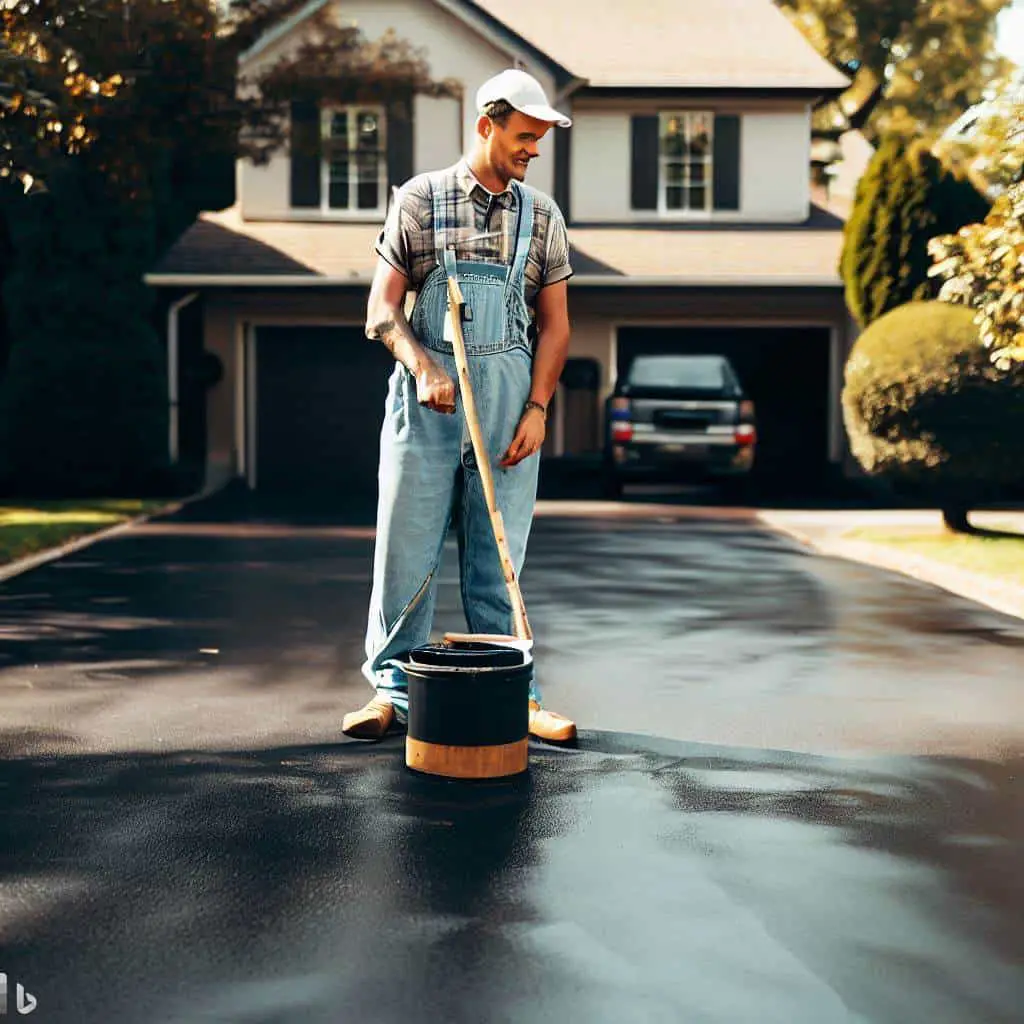As a homeowner, you know that maintaining your property is important. One of the key ways to do so is by taking care of your driveway. Driveway sealing is an essential part of maintaining your driveway’s longevity and appearance. However, many homeowners are unsure about how often to seal their driveway. In this guide, we will provide you with everything you need to know about how often driveway sealing should be done.
Understanding the Purpose of Driveway Sealing
At some point, you may have heard about driveway sealing, but you may not be entirely sure what it is or why it is necessary. Driveway sealing is a process of applying a protective coating to your driveway’s surface to extend its lifespan, protect it from harsh weather conditions, and keep it looking great for years to come.
Driveway sealing is an essential aspect of driveway maintenance that should not be overlooked. In this article, we will delve deeper into the purpose of driveway sealing and explain why it is necessary.
-
Protection against Weather Elements
Driveways are continually exposed to the elements, such as rain, snow, sunlight, and freezing temperatures. Over time, these elements can cause damage to your driveway’s surface, making it look unattractive and even hazardous. By applying a protective sealant, you can safeguard your driveway against these weather elements and prolong its lifespan.

-
Prevents Cracks and Potholes
Cracks and potholes are some of the most common problems associated with driveways. They are unsightly and can even be dangerous if not attended to. Sealing your driveway can help prevent these issues by filling any existing cracks and potholes and preventing new ones from forming.
-
Enhances Curb Appeal
Your driveway is one of the first things people notice when they arrive at your property. A well-maintained driveway can significantly enhance your property’s curb appeal, making it more attractive to potential buyers or visitors.
-
Saves Money
By sealing your driveway regularly, you can avoid costly repairs or even replacement in the future. Regular sealing prevents damage from occurring, thus saving you money in the long run.
-
Easy Maintenance
Sealed driveways are much easier to maintain than unsealed driveways. They are less likely to attract dirt and debris, making them easier to clean. Also, sealed driveways are resistant to stains and spills, making them ideal for households with kids and pets.
Factors That Influence How Often Driveway Sealing Should Be Done
Maintaining the appearance and functionality of a driveway is crucial to the overall aesthetic appeal of your home or business. One of the most common methods of maintaining a driveway is by sealing it. However, many people are often unsure about how often driveway sealing should be done. In this article, we will explore the various factors that can influence how often driveway sealing should be done.
-
Climate
The climate is one of the most important factors that influence how often driveway sealing should be done. Extreme weather conditions, such as heavy rainfall, snowfall, and high temperatures, can cause significant damage to your driveway. The harsh weather conditions can lead to cracks, potholes, and other forms of damage, which can ultimately reduce the lifespan of your driveway. If you live in an area with extreme weather conditions, you may need to seal your driveway more frequently to protect it from damage.
-
Type of Sealer Used
The type of sealer used on your driveway can also affect how often it needs to be sealed. There are two primary types of sealers: oil-based and water-based. Oil-based sealers tend to last longer than water-based sealers, which means you may not need to seal your driveway as often if you use an oil-based sealer. However, oil-based sealers can be more expensive and may take longer to dry.
-
Traffic
The amount of traffic that your driveway receives can also impact how often you need to seal it. If you have a lot of vehicles driving on your driveway, it can cause wear and tear on the surface, leading to cracks and other forms of damage. If you have a high-traffic driveway, you may need to seal it more frequently than a low-traffic driveway to maintain its appearance and functionality.
-
Age of the Driveway
The age of your driveway is another factor that can influence how often it needs to be sealed. Older driveways are more susceptible to damage and wear and tear, which means they may need to be sealed more frequently. Additionally, if your driveway has never been sealed before, it may require more frequent sealing in the beginning to protect it from damage.
-
Maintenance
Regular maintenance is critical to the lifespan of your driveway. If you neglect your driveway and fail to address any issues, such as cracks or potholes, it can lead to more significant damage over time. Regular maintenance, such as cleaning and filling in cracks, can help to prolong the life of your driveway and reduce the need for frequent sealing.
How Often Driveway Sealing Should Be Done
 The frequency of driveway sealing depends on several factors, such as climate, usage, and the quality of the sealant used. In general, it is recommended to seal your driveway every two to three years. However, this can vary depending on the climate in your area. If you live in an area with harsh winters or extreme heat, you may need to seal your driveway more frequently.
The frequency of driveway sealing depends on several factors, such as climate, usage, and the quality of the sealant used. In general, it is recommended to seal your driveway every two to three years. However, this can vary depending on the climate in your area. If you live in an area with harsh winters or extreme heat, you may need to seal your driveway more frequently.
It’s also important to consider the usage of your driveway. If you have a large family or frequently park heavy vehicles on your driveway, you may need to seal it more often. Additionally, the quality of the sealant used can impact how often you need to seal your driveway. A high-quality sealant can last up to five years, while a lower quality sealant may need to be reapplied after just two years.
Signs That Your Driveway Needs to Be Sealed
-
Fading Color
One of the first signs that your driveway needs to be sealed is when the color starts to fade. This is often caused by exposure to the sun’s UV rays, which can break down the surface of your driveway over time. If you notice that your driveway has lost its rich color and is starting to look dull, it’s time to have it sealed. A new coat of sealant can help to restore the color and protect the surface from further damage.
-
Cracks and Potholes
Another sign that your driveway needs to be sealed is when you start to see cracks or potholes forming. These can be caused by a variety of factors, including heavy vehicles, tree roots, and fluctuations in temperature. If left unchecked, these cracks and potholes can grow larger and become a hazard to your vehicles and pedestrians. Sealing your driveway can help to fill in these gaps and prevent them from getting worse.
-
Water Damage
If you notice standing water on your driveway after it rains, it’s a sign that the surface has become damaged and needs to be sealed. Water can seep into the cracks and cause further damage, which can lead to bigger problems down the road. A coat of sealant can help to prevent water from seeping into the surface, protecting it from further damage and prolonging its lifespan.
-
Fading Oil Stains
Oil stains are a common problem for driveways, and they can be difficult to remove once they set in. If you notice that the oil stains on your driveway are starting to fade, it’s a sign that the surface is becoming porous and needs to be sealed. Sealing your driveway can help to prevent oil from seeping into the surface and making stains that are hard to remove.
-
Rough Surface
If your driveway has become rough and uneven over time, it’s a sign that the surface is starting to break down. This can make it difficult to drive on and can be a hazard to your vehicles and pedestrians. Sealing your driveway can help to smooth out the surface and make it safer to use.
Benefits of Regular Driveway Sealing
Regular driveway sealing can offer numerous benefits to homeowners. It not only enhances the appearance of your driveway but also improves its durability, safety, and longevity. As a proficient SEO and high-end copywriter, we have created this article to help you understand the importance of driveway sealing and how it can benefit you in the long run.
Protection from Weather Elements
Driveways are exposed to various weather elements such as rain, snow, and UV rays, which can cause damage over time. Sealing your driveway on a regular basis can protect it from such elements and prevent cracks and potholes from forming. Sealing acts as a barrier between your driveway and the weather, reducing the risk of damage from freeze-thaw cycles and temperature fluctuations.
Enhances Curb Appeal
Regular driveway sealing can improve the overall appearance of your property. A well-maintained driveway adds to the curb appeal of your home and makes it look more inviting. Additionally, it can increase the value of your property if you plan to sell it in the future.
Prevents Cracks and Potholes
Over time, driveways can develop cracks and potholes due to weather, wear and tear, and heavy traffic. Sealing your driveway can prevent these cracks from forming by filling the gaps and making the surface smoother. This, in turn, can prevent accidents and make your driveway safer for your family and visitors.
Saves Money in the Long Run
Regular driveway sealing can save you money in the long run by preventing the need for costly repairs. A well-maintained driveway can last longer and require less maintenance, reducing the overall cost of upkeep. Additionally, it can prevent water from seeping into the cracks and damaging the foundation, which can be expensive to repair.
Increases Durability
Driveway sealing can increase the durability of your driveway by protecting it from damage. The sealant acts as a shield against weather elements, preventing them from penetrating the surface and causing damage. This, in turn, can increase the lifespan of your driveway and save you money in the long run.
Improves Safety
A sealed driveway can improve safety by reducing the risk of accidents caused by cracks and potholes. A smooth surface is easier to drive and walk on, reducing the risk of slips and falls. Additionally, sealing can enhance the visibility of your driveway by making it look brighter and more visible at night.
How to Seal Your Driveway
Sealing your driveway is a DIY-friendly project that can be completed in a weekend. Here’s how to do it:
- Clean your driveway: Before you can seal your driveway, you need to clean it thoroughly. Remove any debris, oil stains, or other substances that may interfere with the sealant.
- Repair any damage: If you notice any cracks or potholes, repair them before sealing your driveway. You can use a concrete patching compound or asphalt filler to fill in the gaps.
- Choose the right sealant: There are two types of driveway sealants – asphalt-based and coal tar-based. Asphalt-based sealants are cheaper, but they don’t last as long as coal tar-based sealants. Coal tar-based sealants are more expensive, but they offer better protection and last longer.
- Apply the sealant: Follow the instructions on the sealant packaging to apply it evenly to your driveway. Use a squeegee or brush to spread the sealant in a thin, even layer. Allow the sealant to dry for at least 24 hours before using your driveway again.
Common Driveway Sealing Mistakes to Avoid
Using the Wrong Sealant
Using the wrong type of sealant can lead to poor results and the need for more frequent resealing. Be sure to choose the right sealant for your driveway based on its age, condition, and traffic level.
Applying Too Much Sealant
Over-applying the sealant can cause it to crack or peel, leading to the need for costly repairs. Follow the instructions on the sealant packaging and apply it in a thin, even layer.
Not Preparing Your Driveway
Failing to clean and repair your driveway before sealing it can lead to poor adhesion and premature wear. Make sure your driveway is clean and free of debris, oil stains, and other substances before applying the sealant.
Sealing Too Often
Sealing your driveway too frequently can lead to buildup and an uneven surface. Follow the recommended timeline of every 2-3 years and monitor your driveway for signs of wear and tear in between.
Frequently Asked Questions (FAQs)
Is it necessary to seal your driveway?
Yes, sealing your driveway is necessary to protect it from weather damage, prevent cracks and potholes, and enhance its appearance.
How long does driveway sealing last?
Driveway sealing can last 2-3 years, but the lifespan depends on several factors, including climate, traffic, and the type of sealant used.
Can I seal my driveway myself?
Yes, driveway sealing is a DIY-friendly project that can be completed in a weekend with the right tools and materials.
How do I clean my driveway before sealing it?
Clean your driveway with a pressure washer or hose and scrub brush to remove any dirt, debris, or stains. If necessary, use a degreaser to remove oil stains.
